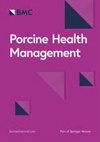Duration of maternally derived antibodies of porcine parvovirus in growing pigs and presence of antibodies in gilts and sows vaccinated with three different parvovirus vaccines
IF 3.1
2区 农林科学
Q1 VETERINARY SCIENCES
引用次数: 0
Abstract
While gilts and sows are regularly vaccinated against the porcine parvovirus (PPV), little is known on the presence of antibodies in vaccinated sows nor the decline of maternally derived antibodies (MDA) in their offspring. On twelve farms serum samples were taken from 180 gilts and sows vaccinated at least twice with one of three different commercial PPV vaccines. On nine farms, additional 270 serum samples were collected from growing pigs of three different age categories. All 450 samples were examined for PPV antibodies (Abs) by ELISA and haemagglutination inhibition (HI) assay. In total, 65% of all gilts vaccinated twice with either vaccine 1 or vaccine 3 were seronegative by HI assay. In each farm, there were at least three animals with high Ab titres (≥ 1:1280) indicating the presence of PPV in all twelve study farms. However, PPV DNA could not be detected in collected faecal samples. While low to moderately high Ab titres (1:10–1:640) were measured in 98% of twelve-weeks-old pigs, ELISA was only positive in 30% of the same pigs. Though, the statement on the duration of MDA may depend on the applied test, we could confirm an exponential decay of MDA. In addition, we could demonstrate that applied serological tools are insufficient for the confirmation of successful vaccination.生长猪体内猪细小病毒母源抗体的持续时间以及接种三种不同细小病毒疫苗的后备母猪和母猪体内抗体的存在情况
虽然后备母猪和母猪定期接种猪细小病毒(PPV)疫苗,但人们对接种过疫苗的母猪体内是否存在抗体以及其后代体内母源抗体(MDA)的下降情况知之甚少。我们在 12 个猪场采集了 180 头后备母猪和母猪的血清样本,这些后备母猪和母猪至少接种过两种不同的 PPV 疫苗。九个农场还从三个不同年龄段的生长猪身上采集了 270 份血清样本。所有 450 份样本均通过 ELISA 和血凝抑制 (HI) 分析法检测 PPV 抗体 (Abs)。经 HI 检测,在接种过 1 号疫苗或 3 号疫苗两次的所有后备母猪中,共有 65% 的猪血清阴性。每个猪场至少有三头动物的抗体滴度较高(≥ 1:1280),这表明所有 12 个研究猪场都存在 PPV。不过,在采集的粪便样本中检测不到 PPV DNA。虽然在 98% 的 12 周龄猪中测出了低至中高的抗体滴度(1:10-1:640),但在这些猪中,只有 30% 的猪在 ELISA 检测中呈阳性。虽然 MDA 的持续时间可能取决于所使用的检测方法,但我们可以确认 MDA 呈指数衰减。此外,我们还证明,应用血清学工具不足以确认疫苗接种是否成功。
本文章由计算机程序翻译,如有差异,请以英文原文为准。
求助全文
约1分钟内获得全文
求助全文
来源期刊

Porcine Health Management
Veterinary-Food Animals
CiteScore
5.40
自引率
5.90%
发文量
49
审稿时长
14 weeks
期刊介绍:
Porcine Health Management (PHM) is an open access peer-reviewed journal that aims to publish relevant, novel and revised information regarding all aspects of swine health medicine and production.
 求助内容:
求助内容: 应助结果提醒方式:
应助结果提醒方式:


